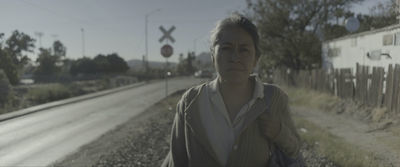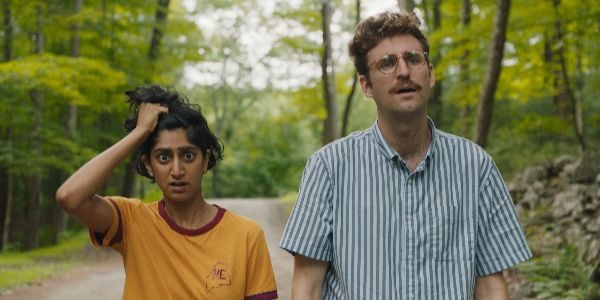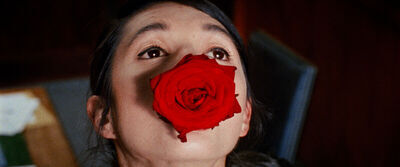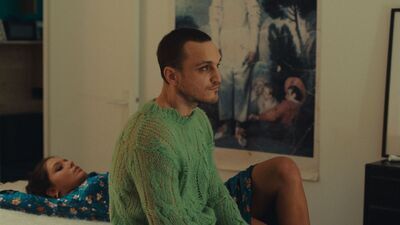Interview with Peter Kim and Oswin Benjamin, Stars of THE FORTY-YEAR-OLD VERSION
Few directorial debuts this year will be as impressionable and as impressive as Radha Blank’s The Forty-Year-Old Version.
The semi-autobiographical film, which follows a thinly-veiled version of the director as she balances her theater career and her new hip-hop gig, won Blank a directing award at this year’s Sundance Film Festival. And now, over half a year later, the project is being released on Netflix.
Film Inquiry recently had the chance to speak with stars Peter Kim and Oswin Benjamin about their experiences working on the film, including their impressions and interactions with Blank’s script, and how their real-life personas merged with that of their characters.
This interview has been edited for clarity.
Luke Parker for Film Inquiry: Obviously, this film is incredibly personal and individual to Radha. As actors assigned to help complete this autobiographical picture, what kind of pressure or motivation did you experience?
Peter Kim: For me, it was mostly motivation, or really just fun. I’ve known Radha for, I think, 10 years now. You know, the film started out originally as a web series, and she had thought of me for that, and that was maybe six years ago. So, I’ve been fortunate enough to be with the project for quite a while, and Radha, being as collaborative and supportive as she is, gave me a lot of space to advocate for Archie, and to bring a lot of my own personal experience as a gay Korean-American man to the role.
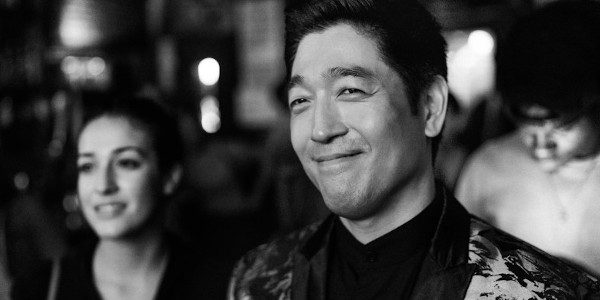
Really, for me, it was a dream to see Radha’s journey trying to get the movie made. And the actual shooting of it was a lot of fun; she made the set really fun and collaborative. I didn’t really feel pressure. I think the only pressure I felt was to make sure I was skinny enough for the movie [laughs].
I joke but I’m serious.
Oswin Benjamin: Even as you were talking right now with the question, that’s one of the first times I’ve heard someone call me an actor out loud. This is the first time I’ve ever acted. So the pressure in that alone, it’s like, “wow, you’re in a movie. And not as the guy on the bus, but in a role.”
Being that the film was so personal, to be entrusted with such a personal part of the film was nerve-racking. Having people like Peter, and Radha, and Eric [Branco, cinematographer] on board, who helped me bring this character to life while continuing to be myself, took a lot of the nerves away. And then it just became fun. I was pleased and happy that I was able to play a role with somebody who trusted me with such a personal part of their lives, and that I was able to get it done in a way that made everyone happy.
Your two characters represent and facilitate Radha’s two artistic worlds in hip-hop and theater. What’s interesting is that you both bring your own perspectives from those arenas into your performances. While portraying and livening your characters, how often did you feel yourselves picking pieces from your own experiences?
Oswin Benjamin: For me, the character that I played was a Brooklyn native and a producer. Aside from this film, my job, my heart, all of that is in music; I’m a recording artist aside from this. So, being in the studio with producers and being in the studio with artists or even being born in Brooklyn, I was able to pick from cousins and studio experiences and a lot of other things to make my character feel as authentic as possible. A lot of the character was pulled from my experiences. I would say about 95 percent.
Peter Kim: It was very easy to relate to the world that Archie lives in. I’m also a producer, mainly of off-Broadway theater for the past seven years or so, and I’ve been acting in the New York City theater for decades. So, it was very easy to step into that world – even the scene where Radha’s show finally gets that big production was shot at the Signature Theater on 42nd Street, where I had performed in a show a few years earlier.
So it felt very familiar in good ways, and some bad ways, too. I feel like now, there’s so much attention being paid to these pre-dominantly White institutions which are New York City theater – off-Broadway and on Broadway. So, it’s very relatable, especially with the older White demographic that watches shows typically, the wealth disparity between theatergoers, and also whose stories are allowed and green-lit to be told to begin with.
Peter, you’ve said that a lot of the characters you audition for are clearly written white, despite being labeled as “open to all ethnicities.” Finding out that your character Archie was originally written as a white character, I was wondering what you noticed or appreciated about the way he was written that made him easy to translate for your performance?
Peter Kim: Because I’ve known Radha and been with the project for so long, I’ve had a lot of agency in shaping the character. And being gay and Korean-American, it felt really wonderful to bring my own personal journey and story into this character.
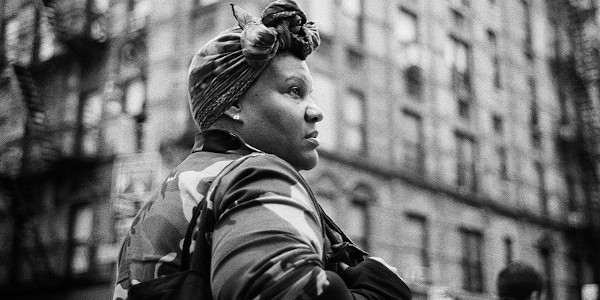
Yeah, I’ve had the fortune of playing non-race specific roles in the past, but then also playing ones that are. What I’ve actually noticed lately, probably within even this month, is that the industry is slowly picking up again. I’ve been asked to audition for certain TV shows and different projects, and all of those have been really Asian-American specific, for Asian-American stories. So it’s no longer like you’re auditioning for the manager of some corporation and you’re there for an episode, but the stories themselves are centering around Asian-Americans. So I feel like there is a shift happening, and that’s really exciting.
Do you find one experience to be more rewarding than the other? What do you value when you’re looking for a role?
Peter Kim: I think what this experience has taught me is to make sure that I’m aligning myself with other collaborators that are like-minded, not in the racial sense. Like Radha is someone that believes in her core in collaboration and uplifting the people that she’s working with. She believes in trusting the people that she’s casted and who she’s hired. And you know, even this story of The Forty-Year-Old Version is also through the lens of, unfortunately, an underrepresented community and group.
So those things all align for me, and that’s what I’m excited about being involved with in the future.
Oswin, I know this was your acting debut. Can you tell me about how you were introduced to the project and what about it made you decide to participate? Because any kind of debut as an artist is a huge decision to make.
Oswin Benjamin: If I’m going to be completely honest with you, I wasn’t going to do it. I was nervous. I was super nervous because I’ve never been asked to do something like this before, besides like two or three-minute music videos that don’t require much acting.
My manager, Kelly Jackson, got an email about this and she wasn’t even in town. She had left town and I was on the phone with her. She was like, “yo, this is the day of the audition, here’s what you got to read.” And I was like, “Yeah, I’m not going.” Even the day before the audition, I was like, “I’m not going.” I’d never done anything like this and usually fear isn’t a thing when I’m about to step into something new, but for this, it was like crippling. Now, I’m happy that I did it, but I wasn’t going to do it. I was too scared.
How did you overcome that apprehension?
Oswin Benjamin: So, Radha and I sat down and had a couple of sessions ahead of the table reads. You know, reading the lines as opposed to being the lines was something that we went over a couple of times. Like, it’s cool that you can read it, but feel what you’re talking about. So there were a couple of times we’d go over one line for 30 minutes or an hour, figuring out what the intention was. I had a lot of help with it from her, from Peter.
On set, it was always welcoming. It wasn’t like school, you know, where you’re the new guy and you’re eating lunch by yourself. It wasn’t that kind of environment. There was a lot of love, and it had an open space for me to mess up and to learn.
I think it’s fair to say that this movie fits into a distinct clique of films based around the New York art world, in that the city plays as much a part as any supporting character. What parts of the city or its culture were you both most excited to see portrayed and explored in the film?
Peter Kim: I think what was exciting for me was that the film talks a lot about economic disparity, actually. And the movie talks about, really, the people who have money, people who don’t have money, people who are kind of in between, and how it’s represented in the areas that they live in.
I mean, it’s not a surprise that Archie lives on the Upper West Side and pays $5 grand a month – not own, but rent $5 grand a month.
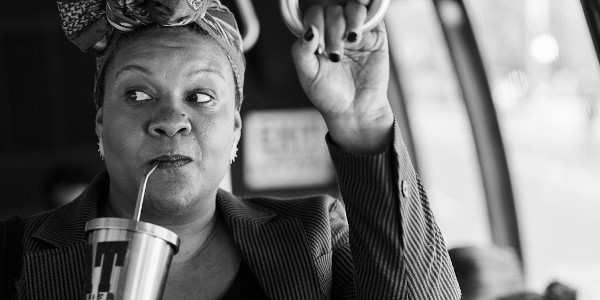
Radha says the movie is about success. For me, it’s about defining success and how each of these characters design success, and for Archie, it was about his environment, these status symbols of wealth and power. And it’s all very specific to New York City. It’s a very specific thing, a very specific idea.
So I was excited to see the depictions of the wealth spectrum in the movie.
Oswin Benjamin: More than having, I guess, a specific part of New York explored in the film, I think what I was the most excited about was the story. I feel like no matter where you are, there’s that uncle at the barbecue who gets drunk and starts rapping, or the aunt that wants to still write books but doesn’t feel like there’s a group to receive her stories. So I enjoyed the fact that the movie was so hip-hop heavy and yet, showed New York in such a real, honest, unadulterated way without all of the extras that come along with hip-hop – or even the stigmas that come with just being Black in New York.
As you mentioned Peter, Radha has said that the defining question of this film is “what is success?” So, to close out, and considering your shared experiences working on and completing this movie, I’ll direct that question to the two of you. What is success?
Peter Kim: The answer to that question has definitely shifted over the years and my time in this industry. I can say now that for me, success looks like being able to work with and collaborate with other storytellers that align in my ethos and mission. But also people who are respectful, kind, and generous. It’s almost like I’d rather hold out and make sure that I get to work with those people than just working with whoever comes my way or what have you. To sum it up, I’d say quality over quantity.
Oswin Benjamin: When it comes to success, I think the most consistent thing for me is having peace. Success is peace. It doesn’t matter what I’m doing, if I can find peace in being a daycare owner, then that’s success to me. I feel like the conversation falls into materialistic things or a monetary goal. I feel like once success is thrown under that umbrella, there’s not a number that’s going to be enough.
No matter what I’m doing, as long as I’m feeling peace, I’m successful.
Film Inquiry thanks Peter Kim and Oswin Benjamin for their time.
The Forty-Year-Old Version will release on Netflix on October 9.
Watch The Forty-Year-Old Version
Does content like this matter to you?
Become a Member and support film journalism. Unlock access to all of Film Inquiry`s great articles. Join a community of like-minded readers who are passionate about cinema – get access to our private members Network, give back to independent filmmakers, and more.
Join now!
